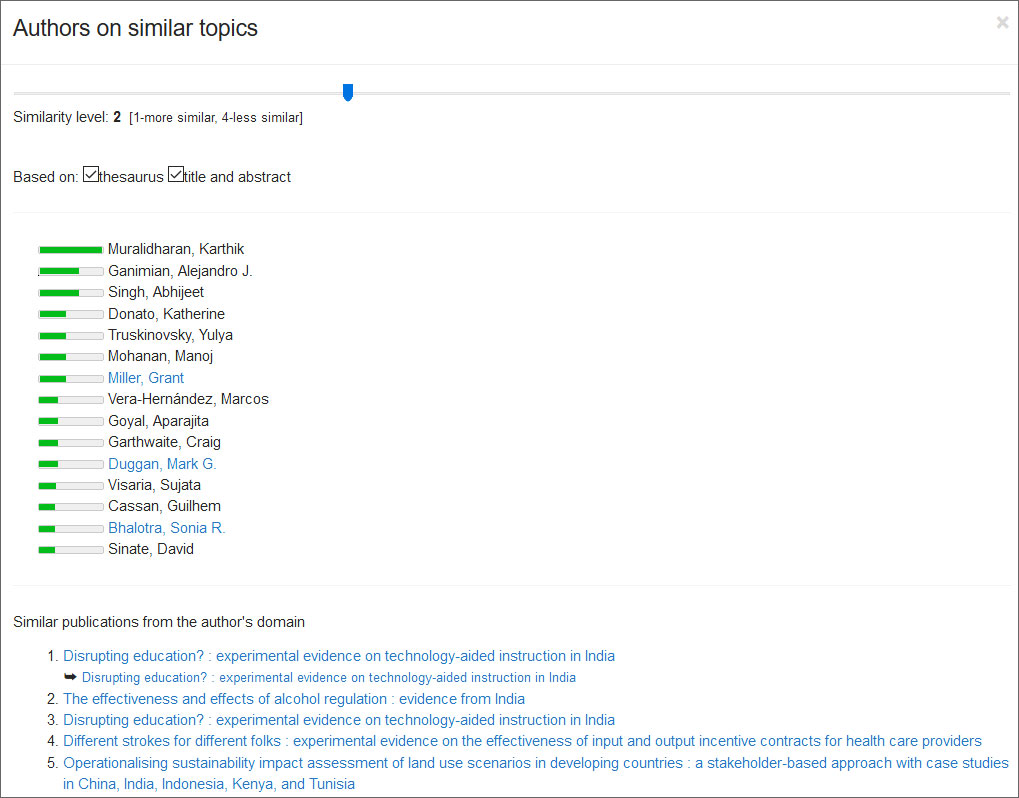
Researcher Profiles in EconBiz: Semi-Automated Generation Based on Linked Open Data
The EconBiz Author Profiles show the most important research areas of an author in Business Studies and Economics, make it easy to get information on the right person in case of duplicate names and provide additional information on the author. Comprehensive author information is provided on one page. The profiles are created by linking existing data and identifiers.
by Arben Hajra, Marie Machel and Tamara Pianos
The EconBiz Author Profiles offer comprehensive information on specific authors in Business Studies and Economics based on the usage of persistent identifiers and linked data approaches to link to further information. The profiles show the most important research areas of an author in a tag cloud. The assigned Persistent Identifiers (PIDs) and additional information connected to authors make it easy to find the right person. Comprehensive author information – like affiliations, prizes, citation infos or Twitter profiles – is provided on one page. The profiles are created by using existing data, services and identifiers. So, no manual input by the authors themselves and only little librarian input is needed in order to create the profiles – if the right identifiers exist.
Linking information with Linked Data Services
Identifiers like the The Integrated Authority File (GND) are used to make sure that it is easy to identify John Smith the economist and ignore of the other John Smiths (for instance the architect or the geologist). On the other hand, if you want to find all publications by 2019 Nobel laureate Abhijit V. Banerjee you should also find the ones attributed to Bannerjee or Vinayak-Banerjee.
The LOBID-search (German) provided by the Hochschulbibliothekszentrum des Landes Nordrhein-Westfalen (hbz) allows a search for names connected to a GND ID. Entity Facts, a service provided by the German National Library (DNB) provides additional information like professions, affiliations or biographical data, about GND entities. In addition, Wikidata (is used as a hub to connect more information such as other author profiles, IDs, pictures or prizes in economics. A short abstract related to authors is retrieved from DBPedia. These services are combined with a search for author publications via the EconBiz API. Information from RePEc and CitEc is used to provide a selection of TOP-authors as well as citation information.
Author Information and Subject Tag Cloud
The Author Profiles can be found by using the search box that integrates the LOBID search service.

There is also a pull-down menu that can be used to select a Nobel laureate. Another pull-down menu covers the TOP 1,000 RePEc authors.

Once a specific author (for example Prof Esther Duflo) is selected, the author profile displays the available information.

The tag-cloud provides an easy overview over the author’s main areas of interest. In addition, the tag-labels serve as a filter for drilling down the publication list of the respective author. Co-authors can be selected by a tab above the tag-cloud making it easy to navigate to the co-author pages as well. The service has recently been enriched with a new feature to search for “related authors”.

The display of related authors makes it possible to find scholars who work on similar topics by analyzing the entire EconBiz collection. A slider makes it possible to play around with the display of more or less similar scholars.
Benefits of the EconBiz Author Profiles
The author profiles provide a number of innovative ways to explore the scholarly output of individual authors. They allow quick overviews on the research interests of a scholar. The linking to more information like co-authors or related authors also allows serendipity finds. Features like the “related author” search also make it possible to purposefully identify scholars who work in a similar field or to find publications relevant to a scholar’s own field of interest.
In contrast to other profile services that ask scholars to provide and verify their information, the EconBiz Author profiles are mostly created automatically using already existing IDs and information and linking it.
Even professionally edited services like the GND sometimes include mistakes or duplicates. Some of the author profile features can be used for quality control since they make it easy to identify possible mistakes.
Limitations of the current service
Right now, the full potential of the service is limited by the fact that not all publications in the EconBiz collection are connected to a GND-ID. This means that publications without a link to the GND cannot be used for the creation of the tag-cloud. Also, the default display of search results from EconBiz is currently based on a string search rather than a GND search since many relevant publications could not be found otherwise. This can lead to some confusion for common author names. In this case, the display of results has to be manually changed to author GND.

Furthermore, as GNDs were introduced as a working tool for some labels like “female lecturer” may be useful internally but irritating for other people. Also, the rule to create a GND-ID if a person with the same name already has a GND-ID, leads to the fact that there may be GNDs for a number of lesser known people. This means that authors who published a lot may not have a GND yet if their names do not fall under the cataloguing rules for the GND. If no GND exists for the author, no author profile can be displayed. In this case a manual creation of a new GND is necessary.
Also, the main subject focus of a researcher may have a bias in years with a high number of publications. Especially for scholars with a long publishing history and a change of subjects over the years this might lay more emphasis on older than on current fields of interest.
In addition, the focus of this service is on authors in the fields of Economics and Business Studies. If authors from a different field like Psychology, Sociology or Computer Science have only a small number of their publications listed in EconBiz the tag-cloud may misrepresent the focus of their work.
Future Prospects
Many of the limitations stated above could be avoided if all relevant publications had an identifier. More identifiers will have to be added in the future either by semi-automated services based on co-authorship-analysis or by crowdsourced solutions using Wikidata as a central hub – or both. All solutions will still need human quality control though.
- The tag-cloud could be adjusted to the selection of publication years in the future.
- If more subject portals offered similar services on authors in other fields there may be options to optimize the display of interdisciplinary authors as well.
- Also, a better integration of the search options in the portal and display of additional author information will make it easier to select the right author or to assess the expertise of a specific author in a specific field.
Further Information
Joachim Neubert: “Wikidata as a linking hub for knowledge organization systems? Integrating an authority mapping into Wikidata and learning lessons for KOS mappings” (PDF) in NKOS Workshop at TPDL, 2017, Thessaloniki, Greece.
Arben Hajra is a PhD Student at the Faculty of Engineering at Christian-Albrechts-Universität (CAU) in Kiel. He graduated in Computer Sciences at South East European University, North Macedonia, and since 2005 has been engaged as a Lecturer at the same department. Starting from 2018, he is working as Research Assistant at the ZBW – Leibniz Information Centre for Economics.
Marie Machel studied Library and Information Management at the Hamburg University of Applied Sciences and is working as an academic librarian specialized in norm data at the ZBW – Leibniz Information Centre for Economics.
Dr Tamara Pianos studied Geography and English literature. After completing her doctorate in Canadian Studies and a traineeship as an academic librarian she worked at the TIB in Hanover. Since 2005, she has been working at the ZBW – Leibniz Information Centre for Economics, where she is now head of Information Provision and Access. She is the product manager of the EconBiz portal and is responsible for information literacy topics.
View Comments

Perspectives on Open Science and Inequity: Who is Left Behind?
Due to precautionary measures in regard to the coronavirus, the second day of this...



